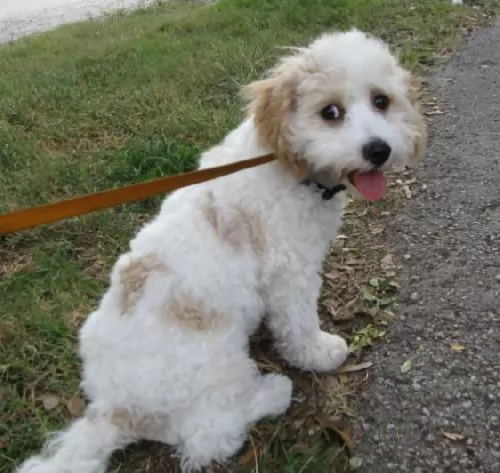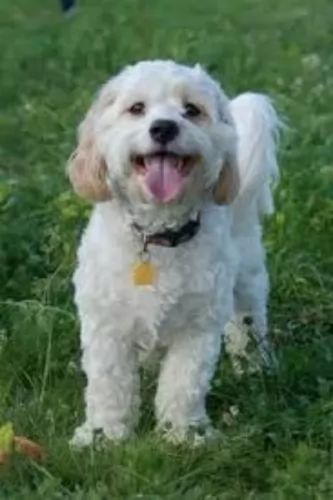 Petzlover
Petzlover Cavachon is originated from United States but Norwegian Lundehund is originated from Norway. Cavachon may grow 7 cm / 2 inches shorter than Norwegian Lundehund. Both Cavachon and Norwegian Lundehund are having almost same weight. Both Cavachon and Norwegian Lundehund has almost same life span. Cavachon may have less litter size than Norwegian Lundehund. Both Cavachon and Norwegian Lundehund requires Moderate Maintenance.
Cavachon is originated from United States but Norwegian Lundehund is originated from Norway. Cavachon may grow 7 cm / 2 inches shorter than Norwegian Lundehund. Both Cavachon and Norwegian Lundehund are having almost same weight. Both Cavachon and Norwegian Lundehund has almost same life span. Cavachon may have less litter size than Norwegian Lundehund. Both Cavachon and Norwegian Lundehund requires Moderate Maintenance.
 The Cavachon dog is a mix of the Bichon Frise and a Cavalier King Charles Spaniel. There isn’t much on the history of the dog but it seems as though certain kennels in Berryville, Virginia, in the United States are the first breeder of the dog, establishing the hybrid dog in 1996.
The Cavachon dog is a mix of the Bichon Frise and a Cavalier King Charles Spaniel. There isn’t much on the history of the dog but it seems as though certain kennels in Berryville, Virginia, in the United States are the first breeder of the dog, establishing the hybrid dog in 1996.
This attractive little toy breed has become one of the most popular cross-breed dogs to own in the United Kingdom, United States, Europe and other parts of the world. As it is a hybrid, the Cavachon isn’t recognized by the American Kennel Club (AKC), but it is recognized by the American Canine Hybrid Club (ACHC).
 The Norwegian Lundehund hails from the island of Vaeroy, Norway and was created for the purpose of puffin hunting.
The Norwegian Lundehund hails from the island of Vaeroy, Norway and was created for the purpose of puffin hunting.
Now that these puffins are a protected species, the dog is no longer used for hunting and has become a companion dog.
The breed decreased in numbers during- and after World War II because the islands where he came from had an outbreak of distemper. It was in 1963 that another outbreak occurred and the dogs were almost wiped out. A breeding program saw their numbers being built up.
It was in 2011 that the dog was recognized by the American Kennel Club.
 Cavachons are small dogs standing from 31 - 33 cm at the withers and weighing 4.5 - 9 kg. He has a medium-to-long silky coat which can be slightly wavy or even straight. The coat is available in several different colors – with white being the main color and he’ll have patches of apricot, tan and black or a mix of these colors.
Cavachons are small dogs standing from 31 - 33 cm at the withers and weighing 4.5 - 9 kg. He has a medium-to-long silky coat which can be slightly wavy or even straight. The coat is available in several different colors – with white being the main color and he’ll have patches of apricot, tan and black or a mix of these colors.
Individual dogs will vary to some extent depending on which parent breed is more dominant, but they’ve generally got a compact, well formed body and short legs. People with allergies appreciate this breed as they don’t shed a lot.
The Cavachon isn’t aggressive at all and they are sweet dogs, enjoying being around children. Their wonderful nature makes them a great therapy dog as they love to charm and delight people. He is tolerant of the actions of children as well as being able to get on well with other dogs and cats in the home.
Even small dogs like the Cavachon however can benefit from training and socialization, and then he becomes a wonderful obedient little dog. He is actually more robust than he looks and this is what makes him such a good pet for children.
He is a social little dog and just loves his human family and doesn’t want to be left alone for any long lengths of time. His lack of aggression means you can’t really rely on him to be much of a guard dog although he will give you some warning with his barking.
 As a spitz-type dog, with the Lundehund you’ll recognize the typical spitz-dog characteristics – the erect ears and the tail that curves over the back.
As a spitz-type dog, with the Lundehund you’ll recognize the typical spitz-dog characteristics – the erect ears and the tail that curves over the back.
He is a small to medium sized dog standing at 30 – 40cm and weighing 6 – 9kg. He is an active dog and is as agile as a fox.
He has a dense double coat which is white, reddish/tan with some black tips. He is a dog which sheds constantly.
Strangely this dog has 6 toes and his rear pads have elongated foot pads which have helped the dog be able to climb over rocks. He also has a flexible type of neck that is capable of craning back so that the head touches the spine. The dog has some unique features and wriggling in and out of small spaces is another of his characteristics. In fact he can do things that you would not imagine a dog could do.
When you have a Lundehund in your life you’ll agree he has a happy, amicable personality. He is non-aggressive.
He will require training and socialization as he is an independent dog who can be obstinate. He is quite aloof with strangers too and once he starts barking at them he tends to want to continue. Training him will put an end to that irritating behavior. He is a loving, loyal dog, enjoying the company of his human family.
 The sweet Cavachon is a balanced, happy, social dog and with his amicable nature and appealing looks, everybody wants him as a friend. He is fun and entertaining and makes a wonderful family pet and playmate for children.
The sweet Cavachon is a balanced, happy, social dog and with his amicable nature and appealing looks, everybody wants him as a friend. He is fun and entertaining and makes a wonderful family pet and playmate for children.
He gets on well with other pets in the home too. Even though he is a small dog, he will require training and socialization as his cuteness tends to make him want to assert himself over his owner. With socialization he becomes the most awesome, loyal and devoted little companion.
 The Norwegian Lundehund isn’t your everyday dog and in fact he is known as a primitive breed. Perhaps he wouldn’t be the best dog to have if you’re a first-time dog owners as training is quite difficult too.
The Norwegian Lundehund isn’t your everyday dog and in fact he is known as a primitive breed. Perhaps he wouldn’t be the best dog to have if you’re a first-time dog owners as training is quite difficult too.
People who are willing to take a chance on him say that with training and socialization he can become a loving canine companion.
 Although a mixed breed such as the Cavachon is considered healthy, they can still have their share of health problems. Some of the common health problems that the Cavachon may have to contend with and which come from the Cavalier King Charles Spaniel and the Bichon Frise are ear infections, liver problems, hip dysplasia and eye problems.
Although a mixed breed such as the Cavachon is considered healthy, they can still have their share of health problems. Some of the common health problems that the Cavachon may have to contend with and which come from the Cavalier King Charles Spaniel and the Bichon Frise are ear infections, liver problems, hip dysplasia and eye problems.
A healthy Cavachon who has been fed well and nurtured can live to be up to 15 to 18 years.
Arthritis is a disease seen in many dogs and it is inflammation of the joints because of wear and tear. You’ll notice lameness with your pet, stiffness, swelling, heat and pain and even depression.
Your pet may even display some aggressive behavior because of the pain, but this is excusable as this isn't an aggressive breed. Osteoarthritis is seen more often in senior dogs. Thankfully the good news is that arthritis can be managed by your vet.
 The Lundehund is prone to digestive disorders but even so he has got a good chance of living to be 11, 12, 13 or 14 years of age with good care.
The Lundehund is prone to digestive disorders but even so he has got a good chance of living to be 11, 12, 13 or 14 years of age with good care.
He is however, one of these dogs prone to health problems of which chronic intestinal disease is one. Its the kind of illness that can recur because it is resistant to treatment.
Experts on these dogs say that they should have a fecal test done every 6 months or so, saying that one thing a bit negative with this dog breed is that you may well be forking out quite a bit on chronic veterinary care.
 The Cavachon is a small dog, so if you have a nice sized garden, a lot of his exercise needs will be met. However he will still want a walk every other day and appreciate ball games in the garden. He can adapt to living in much smaller places but then he will certainly need to be exercised.
The Cavachon is a small dog, so if you have a nice sized garden, a lot of his exercise needs will be met. However he will still want a walk every other day and appreciate ball games in the garden. He can adapt to living in much smaller places but then he will certainly need to be exercised.
Small dog breeds like the Cavachon have a quick metabolism and you want to feed him a top quality dog food high in protein and fat. Protein is important as it supports growth in puppies and promotes lean muscle mass in adult dogs.
The Cavachon’s hair sheds very little, so grooming and brushing will only be required twice a week. His hair may need to be clipped every now and then to keep him well groomed. If you don’t have the experience or the required tools, a professional dog salon in your area will be able to do it for you.
The nails must also be clipped regularly and the ears kept clean and dry to prevent ear infections. His teeth will need to be cleaned at least 2 or 3 times a week with special dog toothpaste and toothbrush to prevent dental decay.
 Like any other dog, the Norwegian Lundehund will do well on the best quality food. If you buy him commercially manufactured food, check the ingredients on the packaging. Lots of these lower quality foods are made from ingredients that are toxic for your pet, so buy a good quality one.
Like any other dog, the Norwegian Lundehund will do well on the best quality food. If you buy him commercially manufactured food, check the ingredients on the packaging. Lots of these lower quality foods are made from ingredients that are toxic for your pet, so buy a good quality one.
Buy food according to your dog’s age and activity levels. To make his meals more interesting, add in some delicious home prepared food for him. Stay away from spicy, exotic foods and go for something like boiled chicken, brown rice and vegetables. Some raw meat added to the kibble from time to time can also do wonders for your pet as he requires a high-protein diet. Make sure he always has access to fresh, cool water.
Other ‘caring’ things to do to make sure your pet has a quality lifestyle is -
Brush his hair twice a week as he is a fairly heavy shedder. Not only does it keep the coat nice and shiny, it builds up a bond between you and your pet.
Check his ears and eyes regularly to make sure they are free from infection.
Clip his nails when they get long as your pet can hurt himself if the nails hook onto things.
Whenever he is ill, get him to the vet for a check-up.
Make sure he has a nice safe, dry, warm, snug place to sleep.
Keep him well exercised. A dog that is put into the backyard and more or less forgotten will be most miserable. Why get a pet if you don’t want to make him a 100% part of the family?